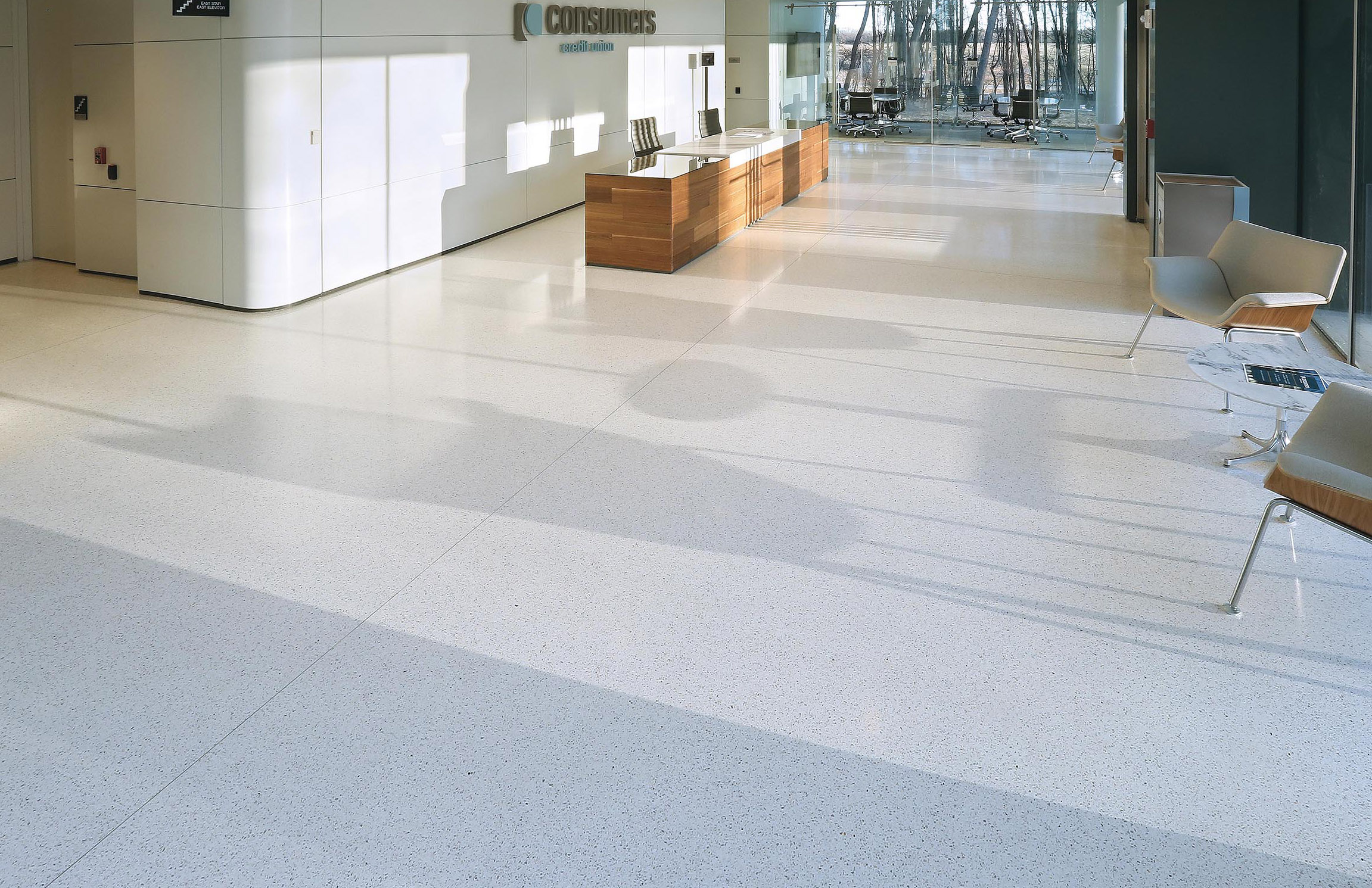
An Owner’s Guide to Terrazzo
Maintenance Precautions
Harsh cleaners and sealers can damage Terrazzo; thus, only materials that are neutral with a pH Factor between 7 and 10 should be used when scrubbing or mopping floors. Avoid all-purpose cleaners or soaps containing water soluble, inorganic, or crystallizing salts, harmful alkali or acids. Sweeping compounds contain oil, which is not only a fire hazard, but will penetrate and could permanently discolor your floor. Many of these compounds contain sand, which is hard to sweep, and can abrade your floor if not removed. Most owners want to see a high sheen on their floors. Since safety in all buildings is a concern, use a water-based sealer in the acrylic family especially designed for Terrazzo use. The Underwriters Laboratories classification of this sealer should include a slip resistance with a coefficient of friction rating of minimum 0.5. Solvent-based sealers tend to discolor with age and pose a removal problem for the user, especially when wear patterns develop or discoloration dictates stripping the surface. This Association sells no product and uses generic terms in our suggestions. We recommend acrylic water-based sealers mopped on, in one or more coats, in accordance with the instructions of the manufacturer. This can also be followed by an acrylic water-based finish for daily or weekly buffing if a high sheen is desired.


Cleaning Procedures
Neutral cleaners are designed to react only in solution with clean water, mixed in accordance to the manufacturer instructions, and allowed to remain on the floor surface for several minutes. This provides the necessary time for the grime dissolving action to take place. Then rinse the dirt-laden solution from the surface by squeegee, vacuum, or mopping. Rinse with ample clean water. It is important to keep the floor wet during this entire cleaning process, so the dirt does not reabsorb in the floor.
How often the floor must be swept or scrubbed depends on the amount of traffic that moves across the floor daily. Normally, daily dust mopping is a requirement in most public buildings. Daily dust mopping removes both the dust and the grit tracked into the building. The grit acts as an abrasive on hard surfaces.
It’s important to learn the type of Terrazzo you’re maintaining!
There are three types of binders used to anchor marble chips or other aggregate in a Terrazzo floor. One is a Portland Cement product; the second is a Poly acrylic-modified Portland Cement which includes an acrylic additive. The third is an Epoxy or Polyester system, often referred to as a resinous thin-set system. Although each system has the role of anchoring the aggregate into the topping, the treatment of each does vary. Terrazzo floors have ease of maintenance, but this does not mean that no care is required. By understanding the care requirements in the early stages of a new Terrazzo floor, you avoid possible problems.
Portland Cement Systems
A Terrazzo surface has a minimum 70% density marble chip surface exposure. The marble chips have a low porosity of absorption; thus, the portion of this floor system that needs protection is the Portland Cement binder that has 30% or less surface exposure. This is why our specification requires a penetrating type sealer applied to this surface immediately following the final polishing. This helps inhibit the penetration of spilled materials upon initial contact with the Terrazzo floor. Spills must be cleaned up immediately in order to prevent stains caused by repeated or long-term exposure. Even standing water can dissolve some sealers. Since it is a penetrating liquid material, it will not produce a high gloss sheen to the floor surface. Once the owner occupies the building, he must strip and reseal the surface, and if desired, apply finish coats to produce a higher sheen.
Resinous Type Terrazzo (Epoxy and Polyester)
Since the matrix in these systems becomes a non-porous surface, no penetrating-type sealer is used on this floor. Use only surface sealers.

To learn more about terrazzo, visit one of our pages below.
